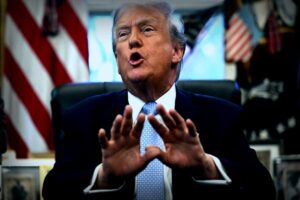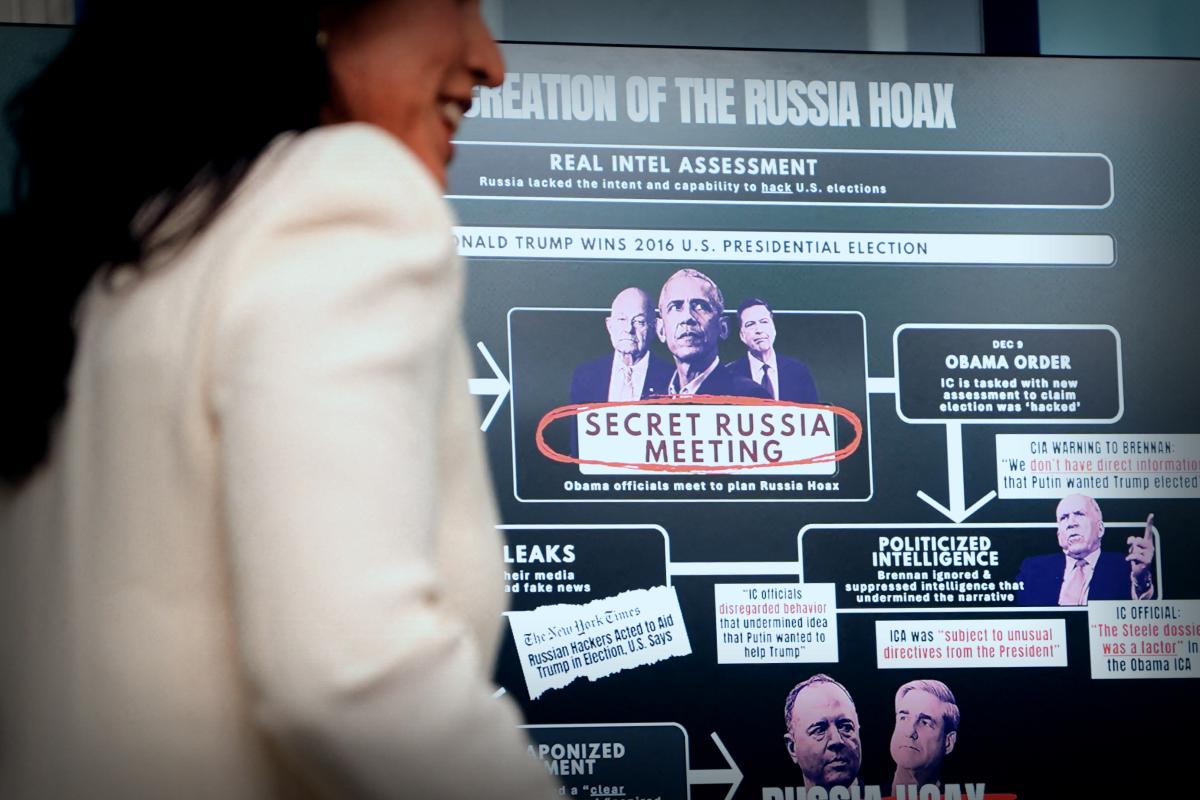In a striking move, Tulsi Gabbard, the Director of National Intelligence, has pulled the security clearances of 37 national security figures that President Trump has labeled as political foes. This action, taken on Tuesday, affects current and former intelligence officials, some of whom are still active in U.S. intelligence roles.
Gabbard’s decision focused on individuals tied to a 2017 evaluation of Russia’s interference in the 2016 presidential race—a report Trump has challenged—and those who played roles in the impeachment proceedings against him during his first term in office, as well as people associated with previous Democratic administrations led by Barack Obama and Joe Biden.
In a memo released on Monday, Gabbard accused these officials of politicizing intelligence, mishandling classified material, or failing to meet professional standards in their intelligence analysis.
Democratic lawmakers and former officials criticized Gabbard’s move as a blatant example of partisan influence within national security agencies and an attempt to target Trump’s perceived enemies.
Former intelligence professionals were left confused and alarmed by the diverse motivations behind the list of revoked clearances, expressing concern over the administration’s apparent enthusiasm for retaliating against dissenters.
One former senior intelligence figure, who preferred to remain unnamed for fear of retribution, compared the indiscriminate nature of the list to a “drive-by shooting.”
Interestingly, many on the list had signed a 2019 letter asserting that Trump’s dealings concerning Ukraine warranted impeachment investigation—a stance that continues to provoke within the Trump camp.
Laura Loomer, a far-right activist, recently highlighted this letter on social media, calling for the revocation of the clearances for those “anti-Trump officials” involved.
This list is quite significant, including high-ranking staff at the CIA and other agencies, alongside former agency employees and congressional aides—some of whom seem to have let their clearances lapse years ago.
Among those affected are at least two individuals who previously collaborated closely with Trump, providing him with regular intelligence updates during his tenure. The range of issues these officials addressed extended beyond Russian relations, covering regions as diverse as the Middle East and Latin America.
Mark Zaid, a lawyer representing intelligence officers, lambasted the recent revocations as unlawful and unconstitutional, pointing out that such actions deviate from established legal standards designed to prevent exactly this kind of partisan retribution. He added that the current administration’s accusations against those who have harmed itself exhibit stark hypocrisy.
Joining Gabbard in her decision are CIA Director John Ratcliffe and others in Trump’s national security circle, as they embark on a campaign to challenge the established view of Russian interference in the 2016 election. They frame such findings as politically motivated conspiracies initiated under Obama, and have even declassified documents to bolster their claims.
However, Gabbard’s memo does not pinpoint specific acts of misconduct for the 37 individuals whose clearances are crumbling.
Charles Kupchan, a former special assistant to Obama who signed the 2019 letter, expressed his bewilderment at being included in the revocation list, assuming his clearance had expired post-White House. He noted that he wouldn’t consider himself a prominent critic of Trump.
Gabbard’s initiation to strip clearances from a random selection of officials raises alarm bells—particularly over potential violations of the separation of powers doctrine. Senator Mark R. Warner of Virginia criticized this execution of power as reckless, suggesting it impedes Congress’s constitutional role of oversight.
A senior advisory figure for Sen. Adam Schiff, Maher Bitar, was also enveloped within the cut—a move highlighted considering Trump’s discord against Schiff throughout the impeachment episodes.
Concerns lingered among political analysts regarding the constitutionality of taking away clearances from congressional aides, where the executive branch might be encroaching on the legislative’s oversight functionalities.
Also noteworthy is Vinh X. Nguyen, a senior NSA official deeply involved in significant national security措施 especially related to cyber threats, which he primarily focused on during Trump’s election period. Currently, he is spearheading AI advancements at NSA, though he declined to comment through connections.
In February 2020, Shelby Pierson, a senior operations figure who once described Russia’s favorability towards Trump, also found her name in the revocation pool. After Trump’s mandatory alternative views led to dismissal of such intelligence, her status within the community has drawn mixed reactions.
Mark Feierstein, who served during both Clinton’s and Obama’s administrations before jumping to the advisory side during the Biden administration, reacted: stating that finding his clearance revoked—even though he hasn’t held one since 2021—was ultimately laughable. He characterized the accusations as reflective of conduct typically witnessed from authoritarian states.
Contribution to this report includes inputs from Perry Stein, Karen DeYoung, and Aaron Schaffer.




















